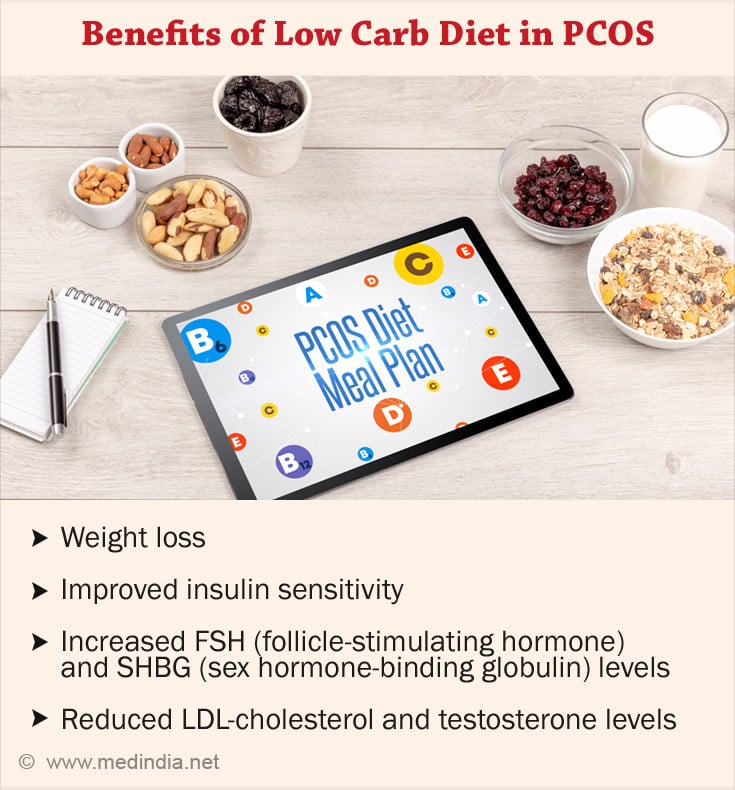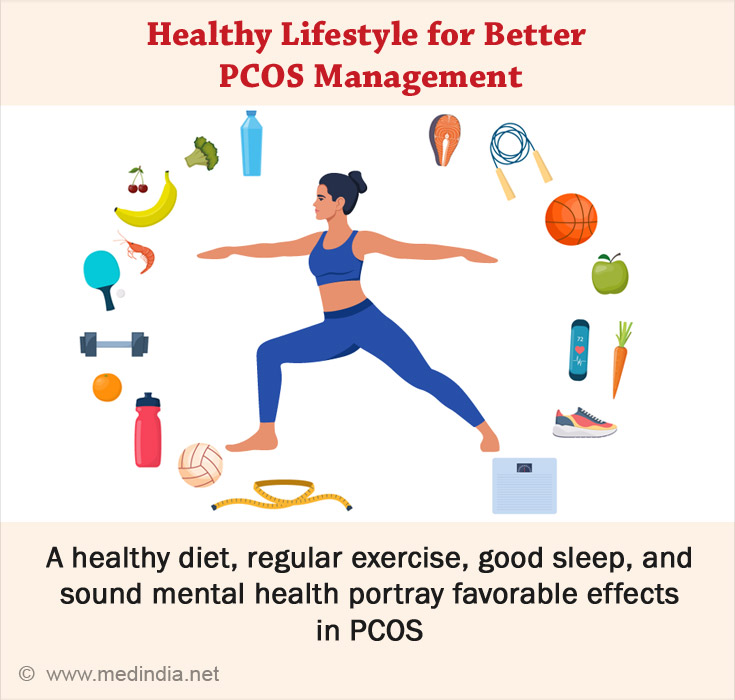- Polycystic Ovary Syndrome: A Comprehensive Review of Pathogenesis, Management, and Drug Repurposing - (https://www.mdpi.com/1422-0067/23/2/583)
- Polycystic ovary syndrome: a review of treatment options with a focus on pharmacological approaches - (https://pubmed.ncbi.nlm.nih.gov/23946629/)
- Dietary Modification for Reproductive Health in Women With Polycystic Ovary Syndrome: A Systematic Review and Meta-Analysis - (https://www.frontiersin.org/articles/10.3389/fendo.2021.735954/full)
- Effect of Diet on Insulin Resistance in Polycystic Ovary Syndrome - (https://academic.oup.com/jcem/article/105/10/3346/5867491)
- The Effect of Low Carbohydrate Diet on Polycystic Ovary Syndrome: A Meta-Analysis of Randomized Controlled Trials - (https://www.hindawi.com/journals/ije/2019/4386401/)
- Mediterranean Diet Combined With a Low-Carbohydrate Dietary Pattern in the Treatment of Overweight Polycystic Ovary Syndrome Patients - (https://www.frontiersin.org/articles/10.3389/fnut.2022.876620/full)
- Effects of Dietary Glycemic Index and Glycemic Load on Cardiometabolic and Reproductive Profiles in Women with Polycystic Ovary Syndrome: A Systematic Review and Meta-analysis of Randomized Controlled Trials - (https://www.sciencedirect.com/science/article/pii/S2161831322003726?via%3Dihub)
- Lifestyle management in polycystic ovary syndrome - beyond diet and physical activity - (https://bmcendocrdisord.biomedcentral.com/articles/10.1186/s12902-022-01208-y)
- PCOS Diet - How Diet Affects Polycystic Ovary Syndrome - (https://www.pcosaa.org/pcos-diet-how-diet-affects-pcos)
- PCOS Diet - (https://www.hopkinsmedicine.org/health/wellness-and-prevention/pcos-diet)
What is PCOS?
Polycystic Ovary Syndrome (PCOS) is an endocrine disorder observed in women of reproductive age. Approximately about 1 in 10 women are estimated to be diagnosed with PCOS before menopause. Irregular menstrual cycle, enlarged ovaries with multiple cysts, excess androgen levels or hormonal imbalance, insulin resistance, weight gain, hirsutism, and acne are the key signs and symptoms of PCOS. PCOS increases the risk of type 2 diabetes, heart disease, dyslipidemia, sleep apnea, anxiety, depression, and endometrial cancer.
The etiology of PCOS includes genetics, environmental triggers, poor diet, lifestyle, stress, insulin resistance, inflammation, high androgen levels, and obesity. Treatment concentrates on managing symptoms such as improving ovulation regulation, insulin sensitivity, and hampering androgen activities. Apart from pharmacological treatments lifestyle changes like weight loss, healthy diet, and regular exercise have been studied to portray shining benefits(1✔ ✔Trusted Source
Polycystic Ovary Syndrome: A Comprehensive Review of Pathogenesis, Management, and Drug Repurposing
Go to source, 2✔ ✔Trusted Source
Polycystic ovary syndrome: a review of treatment options with a focus on pharmacological approaches
Go to source).
Importance of Diet in Managing PCOS Symptoms
Diet and exercise are considered to be the first line of treatment by the International Evidence-based Guideline for the Assessment and Management of PCOS. Evidence depicts that a low carbohydrate diet, Mediterranean diet, DASH (Dietary Approach to Stop Hypertension) diet, and choosing low glycemic index foods may work wonders in PCOS and fertility treatment(3✔ ✔Trusted Source
Dietary Modification for Reproductive Health in Women With Polycystic Ovary Syndrome: A Systematic Review and Meta-Analysis
Go to source).
Insulin Resistance in PCOS
Insulin resistance refers to the insufficient response of cells to insulin and is very common among PCOS women. High levels of insulin shoot up testosterone levels and inhibit the production of insulin-like growth factor (IGF-1) binding protein in the liver. This inhibition increases IGF-1 levels in the blood and thereby high androgen production, poor follicle growth, immature follicles, menstrual irregularity, and infertility(1✔ ✔Trusted Source
Polycystic Ovary Syndrome: A Comprehensive Review of Pathogenesis, Management, and Drug Repurposing
Go to source).
Diet has shown instrumental benefits in mitigating insulin resistance. Mediterranean diet, DASH diet, and calorie-restricted diets may assist in regulating fasting insulin and fasting blood glucose levels(4✔ ✔Trusted Source
Effect of Diet on Insulin Resistance in Polycystic Ovary Syndrome
Go to source).
PCOS Friendly Dietary Patterns
Diets rich in carbohydrates may induce ovulatory disorders and increase the risk of infertility. A low carbohydrate diet (LCD) refers to limiting or reducing carbohydrates to less than 45% of total calories. A low-carb diet helps in weight loss, improves insulin sensitivity, increases FSH (follicle-stimulating hormone) and SHBG (sex hormone-binding globulin) levels, and reduces LDL-cholesterol and testosterone levels. Consuming a LCD for more than four weeks may help curtail testosterone levels. It may also aid in inhibiting hyperandrogenism-related symptoms by regulating hormonal balance(5✔ ✔Trusted Source
The Effect of Low Carbohydrate Diet on Polycystic Ovary Syndrome: A Meta-Analysis of Randomized Controlled Trials
Go to source).

A randomized clinical trial among overweight PCOS subjects compared the effects of the Mediterranean diet combined with LCD and a low-fat diet. Subjects following the former dietary pattern showed reductions in body weight, BMI, waist circumference, body fat percentage, luteinizing hormone levels, testosterone levels, triglycerides, LDL-cholesterol, and total cholesterol levels(5✔ ✔Trusted Source
The Effect of Low Carbohydrate Diet on Polycystic Ovary Syndrome: A Meta-Analysis of Randomized Controlled Trials
Go to source).
Crafting a diet plan low in carbohydrates and glycemic index has been shown to improve anthropometric parameters, reduce insulin resistance, and regulate hormone levels and the menstrual cycle. Low-glycemic index foods include green leafy vegetables, broccoli, lentils, soya, and citrus fruits. Avoiding cakes, cookies, white rice, chocolates, watermelon, and other high glycemic index foods portray effective reproductive outcomes(1✔ ✔Trusted Source
Polycystic Ovary Syndrome: A Comprehensive Review of Pathogenesis, Management, and Drug Repurposing
Go to source, 7✔ ✔Trusted Source
Effects of Dietary Glycemic Index and Glycemic Load on Cardiometabolic and Reproductive Profiles in Women with Polycystic Ovary Syndrome: A Systematic Review and Meta-analysis of Randomized Controlled Trials
Go to source).
The DASH (Dietary Approach to Stop Hypertension) diet is well-known to turn down insulin resistance. This diet includes fruits, vegetables, whole grains, legumes, low-fat dairy products, and nuts. Studies found that consuming the DASH diet for 8 to 12 weeks helped in weight loss, hormonal balance, and insulin sensitivity.
The vegetarian and vegan diets have shown benefits in weight reduction and insulin sensitivity. The presence of high fiber, protein, and prebiotics in plant sources may help in microbial diversity, thus culturing a healthy gut microbiota(8✔ ✔Trusted Source
Lifestyle management in polycystic ovary syndrome - beyond diet and physical activity
Go to source).
Foods to Include in PCOS
The best foods for PCOS include those high in fiber, protein and low in carbohydrates, fat, and glycemic index. Some of the high-fiber foods to include in PCOS meal planning are Brussels sprouts, red and green peppers, broccoli, cauliflower, beans, lentils and green leafy vegetables.
High-protein foods like lean cuts of chicken, salmon, sardines, almonds, lentils, legumes, and eggs can be consumed.
Blueberries, strawberries, tomatoes, spinach, almonds, olive oil, and foods rich in omega-3 fatty acids like fish and nuts help in reducing inflammation(9✔ ✔Trusted Source
PCOS Diet - How Diet Affects Polycystic Ovary Syndrome
Go to source, 10✔ ✔Trusted Source
PCOS Diet
Go to source).
Foods to Avoid in PCOS
Processed foods, red meats, white bread, fried foods (like French fries, fried chicken, and chips), refined flour and its products, sugar foods (like chocolates, sweetened beverages, cakes, and sweets), butter, and margarine may pose harmful effects on PCOS. Unhealthy lifestyle habits such as excessive alcohol consumption and smoking tobacco may exhibit negative output. Smoking is an independent risk factor for PCOS and is associated with increased testosterone, total cholesterol, and LDL- cholesterol levels(8✔ ✔Trusted Source
Lifestyle management in polycystic ovary syndrome - beyond diet and physical activity
Go to source, 9✔ ✔Trusted Source
PCOS Diet - How Diet Affects Polycystic Ovary Syndrome
Go to source).
Key Supplements for PCOS
Vitamin D, resveratrol, omega-3 fatty acids, folic acid, alpha-lipoic acid, myoinositol, and d-chiro-inositol have been researched exclusively in PCOS. Alpha-lipoic acid and omega-3 fatty acid aid in improving lipid parameters, insulin sensitivity, and reduces inflammation. Berberine, a nutraceutical, may act against insulin resistance and obesity. Myoinositol and d-chiro-inositol are well-studied supplements that improve insulin receptor activity, restore ovulatory functions, and improve pregnancy rate(1✔ ✔Trusted Source
Polycystic Ovary Syndrome: A Comprehensive Review of Pathogenesis, Management, and Drug Repurposing
Go to source).
Healthy Lifestyle for Better PCOS Management
Some of the lifestyle modifications to lower PCOS risk are discussed below.
- Exercise: Regular exercise imparts excellent benefits such as weight loss, insulin sensitivity, aerobic fitness, and reduced total cholesterol, LDL-cholesterol levels, and body fat percentage. Research demonstrated that vigorous aerobic exercise helps in weight loss, cardio-respiratory fitness, and reduces insulin resistance, waist circumference, and BMI.
- Sleep: As for the general population, poor sleep is associated with insulin resistance, excess weight gain, diabetes, and heart disease in PCOS, as well. Lack of sleep and poor sleep quality are frequently reported in PCOS women. Reduced estrogen levels in PCOS affect the metabolism of neurotransmitters involved in the sleep mechanism. Melatonin, the vital sleep hormone also plays a role in ovarian function. Sleep has effects on an individual’s eating and activity habits. Hence, it is essential to emphasize adequate sleep as part of lifestyle changes for effective outcomes.

- Mental Health: Anxiety and depression are frequently observed in women with PCOS. Assessing and helping them with their mental distress can help achieve successful therapeutic outcomes. A study found that providing group counseling on mental wellness increased adherence to exercise and healthy eating habits(8✔ ✔Trusted Source
Lifestyle management in polycystic ovary syndrome - beyond diet and physical activity
Go to source).
Seeking Professional Guidance
A clinical professional is the right person to reach out to when experiencing PCOS-related symptoms. A nutrition specialist will assess and provide evidence-based, practical diet plans to rule out symptoms and bring back menstrual regularity.
Healthy Lifestyle: The Magic Pill for PCOS
There’s no one magical food ingredient that could cast its spell to reimburse health in PCOS. A holistic approach incorporating branches of interventions namely healthy diet, physical activity, sleep, and mental wellness may offer positive treatment outcomes in Polycystic Ovary Syndrome.





